
2 minute read
YOUR SAY
from 2017-10 Sydney (1)
by Indian Link
Lessons From The Lamb Ad
HARSHAD PANDHARIPANDE wrote on how the community handled the infamous lamb ad featuring Ganesha eating meat.
Sadanandan Nambiar AO wrote: I was interested in your coverage of the concern raised by some members of the Indian community and subsequent media news about the protest related to the depiction of a version of Ganesh (an actor with a mask around a funny dinner table) in a TV advertisement promoting the consumption of Australian lamb meat. Around the dinner table were similar caricatures from several other religions and beliefs. The advertisement was a display of typical Australian humour, and a commonly seen marketing ploy. That is all. I gave up eating meat some years ago.
I understand the sentiments of Ganesh worshippers. However, with due respect to their views, I would like to share another perspective through your columns. In comparison with all other religions in the world, Hindu thought probably allows the highest form of flexibility, in matters of intellectual freedom, debates and multiple paths to spiritual enlightenment. Hindu gods are the embodiment of virtues and faults, passionate sexuality and deep and contemplation, acquisition of brutal power and detachment into nothingness. Krishna is an embodiment of just about every fault that we have, yet he is divine to millions. Hindu mythology is replete with paradoxes; Ganesh is a god to many, but also a jolly-good, indulging, over-eating guy to many. Creation (not by birth) of Ganesh himself is the ultimate paradox, an outcome of an unbelievably cruel act of impulse, anger, vanity and compromise. Yet, millions worship Him and find in Him a source of support and seek his blessings for wealth. If Ganesh is a personification of God or God himself to a true worshipper, how can Ganesh be dishonoured by man’s jokes or stupidity? Is He not above such things?
Vegetarianism is not necessarily a Hindu belief; it came into practice in some sections of Hindu communities very long after Hindu philosophical thoughts were well advanced. Today, millions of non-vegetarians and Indians classed as “lower caste” worship Ganesh in India.
Explicitly and wildly sexual carvings on stone walls in our many great monuments and places of past worship would more than match the most pornographic displays found today. Such were the strengths of our ancestral thoughts, truth seeking and wisdom.
Our mythology and epics are full of humour and jokes. For centuries, Vaishnavites (followers of Vishnu) and Shaivites (followers of Shiva) joked, abused and insulted each other, one calling the other “meat-eating, drunken mongrels”. There are brilliant Sanskrit plays written about this and such plays have entertained and enlightened Indians - Hindus - for centuries.
Some years ago, I played the lead role of Sathyasoma, a Shaivate monk, a drunken, cunning, half-mad, rude, womanising yet jealous fellow, to a packed audience (with repeat performance!) in a small theatre in Adelaide; my wife acted as Devasoma, my call-girl offering “hot-pleasures”! That was a Sanskrit play written a few centuries ago and staged in temples. These are rich and intelligent traditions of Hindu thoughts and culture.
For an analysis of the extraordinary intellectual dimension of the deeper Hindu thoughts, as depicted in the great epic Mahabharata, I commend to your readers the scholarly and compelling book by the illustrious writer Gurucharan Das, called The Difficulty of Being Good: On the subtle art of dharma.
Our community would do well to take these things with a sense of humour, as intended by those who created the MLA advertisement, and take such stunts in our stride with a broader perspective, informed by higher order thoughts about the meaning of Hindu Gods and our philosophy.
Voice raised to draw attention to the recent misinterpretation of the Indian national boundary is a serious and important one. In future, we would make more impacts and gain respect, if we learn to target our concerns and protests more selectively and judiciously, and on matters that really count for India, Indian secular diaspora and Australia. If we fail to uphold Indian issues in judicious ways, we might descend to be seen as petty and immature.










